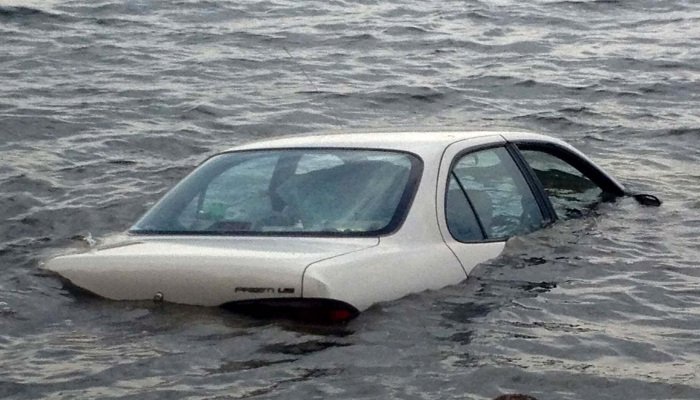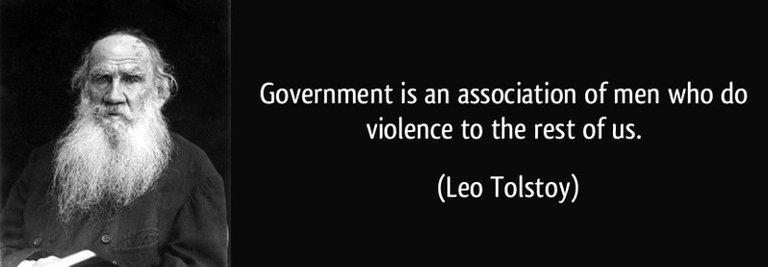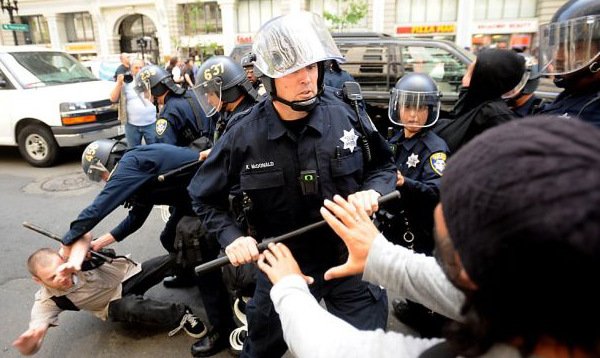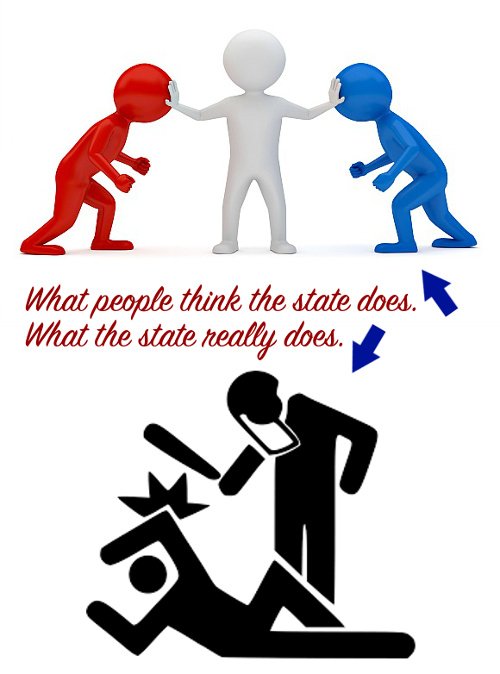
The purpose of this article is to explain a concept I refer to as “social equilibrium.” (I’m sure other people have talked about similar concepts, though probably using different terminology.) First of all, “social equilibrium” is a way to describe how things are, not necessarily how things should be. However, it’s still a useful concept for being able to picture how a stateless society would probably function.
In short, “social equilibrium” refers to a situation in which no one feels the need to use physical force against anyone else. That describes most people, in most places, most of the time. But let’s consider an example of an exception.

Suppose there was a little town, and every night the same bozo would come speeding through town in his car, drunk off his gourd, swerving around, endangering people. And suppose that one night some guy in town decided he had had enough, and decided something needed to be done: he felt he needed to resort to using force against the drunk driver.
So the next time the drunk dude was approaching in his car, the “concerned citizen” guy who had had enough decided to park his own car across the road, and dragged the drunk dude out of his car when he stopped, took his keys, and promptly rolled the drunkard’s car into the lake at the edge of town.

The moment the “concerned citizen” decided he had to personally intervene, by force, there was no longer a state of “social equilibrium.” But once the car was at the bottom of the lake, then each individual who knew of the situation would have to decide for himself whether he felt the need to use force against anyone. If no one felt the need to use force, things would be back to a state of “social equilibrium.”
Maybe the drunk driver would feel like he was wronged, and would respond with violence. Or maybe he would be too scared to do so. Or maybe he would actually feel guilty about having endangered people. Maybe some other people in the town might applaud the “concerned citizen’s” actions (driving the drunk’s car into the lake). Maybe others would think that was too harsh a response, but would decide not to resort to using physical violence themselves.
Again, none of this is about whether justice was served, or whether the outcome was actually a good outcome. Whether there is “social equilibrium” depends only upon whether anyone still feels the need to use physical force. But the concept is still useful when it comes to predicting human behavior.

Most people, most of the time, value “social equilibrium” more than they mind a little bit of injustice. As proof of this, there are already a lot of situations in which people just “let it slide” when someone else does something wrong, but relatively mild. Countless traffic-related altercations, for example, are “resolved” by people swearing at each other, and then forgetting about it, therefore maintaining “social equilibrium.” Even in situations where defensive or retaliatory force probably should have been used, many people, for whatever reason, often choose to “let bygones be bygones.”
It’s important to understand this because most of the dire predictions made by statists about how things would be without a ruling class show that they really don’t understand how “social equilibrium” works. A classic example was when liberals predicted that a lack of “gun control” laws would make every fender-bender into a fatal shootout. To think that normal people would regularly want small disagreements to escalate to mortal combat shows a profound misunderstand of how most human beings function.
The phenomenon of “social equilibrium” can be seen as a civilizing influence, even when justice is not actually served. Whether it’s from forgiveness, or fear, or just plain laziness, when everyone decides that they personally aren’t going to use violence, there is at least superficial peace. It might mean nasty people “get away” with some stuff they shouldn’t. But countless millions of disputes, or potential disputes, are already resolved by people taking the attitude of, “You’re a jackass, but whatever; I have more important things to do with my time than fight you.” Most people, most of the time, try to avoid violent confrontation, and when violence is already occurring, are eager for it to end. (This is true even of most nasty, selfish people, most of the time, simply because engaging in violent combat creates a risk to themselves.)

Now compare that to how “government” functions, and what it does, which is the exact opposite of “social equilibrium.” Everything it does, every “law” that is enacted and enforced, consists of a command or demand backed by a threat of violence. And when “law enforcers” don’t get their way, they will almost always keep escalating things until they do (or until something drastic defeats them). This mentality—the mentality of all “law enforcers,” tax collectors, inspectors, and all manner of other parasitic bureaucrat—is constantly creating, amplifying, and perpetuating violent conflict and strife.
Their job requires them to start fights and escalate all sorts of situations to include physical force. Every time they put on their red and blue lights, that means, “Stop and comply with my demands, or I and my fellow gang members will do whatever it takes to make you stop and comply!” “Law enforcers” are specifically taught to quickly get control of every situation they encounter, even if it takes extreme force to do so. In other words, agents of the state are the one category of people that, instead of usually wanting to de-escalate things and avoid confrontation, do things which create violent conflict and eliminate “social equilibrium.”

What makes this especially ironic is that most statists believe that the very thing which is the direct cause of the vast majority of violent conflict in the world (namely, authoritarian power) is a civilizing influence, and believe that without it, people just acting on their own would behave like violent animals. All of human history, and the very nature of “government,” demonstrate the exact opposite: those who take on the job of forcing the will of a ruling class upon everyone else are the least peaceful people around—the ones least willing to leave people alone, and the ones most likely to create, perpetuate and prolong strife and physical confrontations.
Even when people settle their disputes “legally,” that is not “government” preventing violence; it is “government” putting a huge amount of potential violence on one side of the dispute or the other. When people “settle” disagreements in court, that is just people fighting over who can get the huge “government” club of violence on their side, by way of getting some politically-appointed god-complex jackass in a black dress (a “judge”) to take their side. Court “rulings” are still just a threat of violence. That is what “government” always does, and always is.

If you doubt it, see what happens if you fail to pay “taxes,” or if you ignore the commands of someone with a badge, or if you disregard any of the “regulations” or “laws” of “government,” however stupid or trivial they may be. Deep down inside, all statists understand that disobeying political “authorities” will, sooner or later, result in thugs of the state forcing compliance. And yet most statists still believe the absurd claim that the gang of professional instigators, aggressors, thieves, thugs and terrorists known as “government” is what makes peaceful coexistence possible.

Amazing post @larkenrose. You really made lot of effort
Have you ever done a deep-dive break down of the Hobbesian Leviathan philosophy? I think many Statist (especially those who wouldn't consider themselves statists) think this has all been figured out before and some strong force has to be put in place to prevent wars, nuclear conflict, the proliferation of weapons of mass destruction, protection of the environment, etc, etc. They fail to see how government is usually the worst offender in these categories, but they are sold on the "We need a strong force" idea in that with one stronger force than any other, decentralized disputes won't escalate to more and more violence (on the net). If a cop beats someone up and puts them in jail who was involved in a conflict with others and resisting arrest, the thinking goes, it prevents families and gangs from unending escalation of retaliatory violence which then lowers the well-being of everyone else around them. The "keepers of the peace" aren't as interested in justice as they are in removing conflict (IMO).
I'd love for you to deconstruct that thinking using statistical evidence. I sometimes wonder if voluntaryists (myself included) value freedom more than we value the freedom well-being brings. If our ideas work at scale, I really hope we can start showing evidence of that.
As an example, should everyone be "free" to own weapons of mass destruction assuming they become easier and easier to produce in the future? Does that create a systemic risk which lowers everyone's well-being as whole cities can get taken out by crazy people? If so, would we then socially agree to take action against those who did try to own and trade in those weapons?
I love the pure ideological and rational arguments of anarchy/voluntaryism, but I often feel it gets a little "hand wavy" when it comes to solving real social problems which are emergent properties of many human beings living together in small spaces like cities. If the goal is to increase well-being could that ever, under any circumstances at all, involve giving up some freedoms (such as wanting to own weapons of mass destruction)?
I also wonder how much our upbringing (children being spanked, primitive evolutionary psychology of male-dominated violence, etc) plays a role as well. When I thin about that, I further think about how evolutionary stable strategies and wonder if "pirates" could ever by fully eliminated.
You have some very interesting ideas going though here. It noticeable that you are also struggling to see solutions. I don't to have the solutions, but if you are a curious person, I will recommend a few philosophers that bring answers to this ideas of a world free of political states. Look for Ayn Rand, Ludwig von Mises, Andrew Joseph Galambos and Jay Stuart Snelson. The V-50 lectures they exposed completely blew my mind as to possibilities we will have in a free society. You will have to go down the rabbit hole to see for yourself.
To you example of the nuclear weapons, I think that in a stateless world 99.999% of individuals will be completely disinterested in acquiring and using weapons of mass destruction. My reasons:
It is extremely expensive to refine uranium to fissile material and develop weapons. BILLIONS of dollars. Radical individuals will never be able to afford it or will be highly dis-motivated. Financing: who would finance a radical when there will no more wars to fight? NO ONE... No incentive of profit.
Political states are the only ones interested in weapons of mass destruction and many of them hold them only as a deterrence mechanism.
I think we will have LESS radicals when funds instead of going to a cohersive political state, will go to mental health research, energy research, biological sciences research, and development of social (property protection) sciences.
3.b. Also... A state of freedom is a much more natural environment aligned with other the nature of individuals and groups. When we are misaligned from environment, some people tend to lose it man. I firmly believe people are naturally self-interested. That self-interest is what drives us to trade (that is natural for us). That same self-interest will breed environments where individuals will not be attracted to destruction for its own sake.
In a state of freedom...I think civil groups and property protection interested parties (insurance companies and private security) will do a great job in quickly identifying and disarming dangerous individuals. This is in the assumption that private security firms are MUCH MORE (fact!) effective than state security and will be MORE motivated than the state since they are following their self-interest.
I'm not familiar with Andrew Joseph Galambos and Jay Stuart Snelson. I'll have to check them out. I've read/listened to quite a bit of Rand and Mises. I'm labeled an anarchist/voluntaryist, but I like to avoid being typecast and enjoy debating Larken once in a while to ensure he's being kept on his toes with his own ideology as well.
Those who would acquire and use weapons of mass destruction are crazy. We'll always have to deal with crazy people. I agree, for now, nuclear weapons are outside of the ability of anyone who isn't a nationstate, but given the rise of technology do you think that will always be the case? I think other weapons like chemical weapons will be 3D printable at some point in the not so distant future.
Crazy people don't care about profit. They care about their insane religious beliefs or they just want to see the world burn. It's a very, very small percentage of the human population, sure. But that small amount of people can do a lot of harm which is kind of my point. The existence of the weapons themselves creates the systemic risk. If we recognize that, it also has something to say about the various other weapons we think should or shouldn't exist in a peaceful society.
Unfortunately many crazy people want them too.
I like this perspective a lot and I agree it fits for almost all of humanity. Unfortunately, we still have some crazy people to deal with. Hopefully, as you say, they will decrease as we move away from a society built on violent conflict towards one built on peace and cooperation.
Yes, I talk about Detroit Threat Management often. They, I think, are an excellent example of what's possible.
@lukestokes
I also avoid being typecast. I think that no outlook will be the same. It clear that you guys are advocates of Freedom at all levels and we both want un-cohersive, VOLUNTARY accepted governments.
In a more general sense, my opinion is that the political states are a major source of violence and cohersion. This un natural system is not compatible with the liberty seeking spirit of individuals. I mean that at a metaphysical / quantum level, our human nature is not compatible with the political state system we see now. This dis phase is one source of religiously and political motivated ideas.
Also, certain programs in the political states directly create violence: false flag shootings, MK9 mind control programs, almost ALL USA clandestine services operations, etc.
This is our starting point. This is what we have had up until now.
As we continue in working to create a new and improved system that ensure Freedom to the masses, things can only get better. I think that as we create more natural systems of government that are aligned with human nature, we will see less violence and radical individuals. It is unreasonable to say that there never be some incident in the future, but the likelihood and frequency of these events will SIGNIFICANTLY drop.
What do you think?
Thank you, I have been enjoying our conversation.
That relates, at least to some degree, with an article I almost have finished about the whole "final decider" fetish that statists have, and why it's so horrendously destructive.
Excellent! Looking forward to it.
We have a wonderful "technological" society that works, mostly by pure luck.
So many of our systems are so fragile, and so vulnerable, that anyone with any knowledge could take them out.
This includes a person armed only with a shovel.
So, WMDs, the only people stupid enough to use them are govern-cements.
To everyone else its, I still have to live here.
And the way this will be solved is seen in the difference between a home schooled kid and a govern-cement schooled kid. In govern-cement school you are shown that force is the only way to do anything, and that all interactions boil down to who brings the most force. Whereas the home schooled kid has learned about self reliance and win win negotiation. (actually it is very apparent, unless you are indoctrinated for 12 years upon the use of force)
So, in the near future, people will start from the position of, going to war is stupid. Doing so will get neither of our needs/wants met (at the bare minimum). And thus will begin world peace.
When normal people find out what cops actually do, they are shocked.
They believe in such shows as CSI, where they go to incredible lengths to solve a crime.
When in reality, the police stop looking when they have "enough" evidence.
Wife was murdered, its usually the husband, he was there at the time. Book him, case closed. Now its the DAs responsibility.
50% of murders aren't even investigated. The biggest capital crime, univestigated, and we have cops pulling people over for speeding.
But then, that is what cops are really for. Revenue collection, in the name of social equilibrium.
That's why I refer to them as Revenue Officers and not Cops. Their primary directive is to make cash. If they repeatedly fail to do so they won't be cops for very long... no matter how much they swear up and down that there are no quotas.
Excellent work!
Another great example of getting into the psychology behind liberty and a stateless, peaceful society.
Nice post, I have never thought about this before. However Its not clear what alternative you propose and how would it work in practice?
There is no alternative to the phenomenon. It's just a part of human nature. But understanding it helps people understand why not having a ruling class is NOT going to mean violent mayhem.
I agree with you there. However what I meant was what long term alternative to government do you see working for society? I believe we need to reduce the influence of government, and change most institutions into something friendlier to the individual, but what I dont see is things like infrastructure, social security and regulation of monopolies (although we dont see such a great job being done by governments) working out in an "anarcho-capitalist" society. Care to share your view?
https://steemit.com/voluntaryism/@scottermonkey/law-without-government shows a few solutions that might answer your question :-)
Great question. I don't know Larken's answer - but here is mine; https://www.titanians.org/ethics-law-government .
How cool... I didn't know you were on here! I've been watching some of your Y-Tube videos. Mancur Olson wrote (and I paraphrase) "The first man who having fomented an organized capacity for violence is the true founder of civilization. He was speaking as a part of a study of a Chinese warlord and the relationship between the governors and the governed... Providing protection from bands of "roving bandits" by becoming "stationary bandits."
Although I agree in principle I thought the stateless example should have been 'An unfaithful wife accuses her lover of rape and the town lynches the man.' No justice is done, but the perception of violence is responded to with violence and social equilibrium is restored. Not necessarily always for the best, but I completely agree the state only perpetuates the mentality of violence.
This is a wonderful post. Really inspiring. Until now I didn't really thought about the relationship between governments and violence in such a way. @larkenrose, thank you for sharing your thoughts. Cheers.
click here.Congratulations @larkenrose, this post is the tenth most rewarded post (based on pending payouts) in the last 12 hours written by a Superuser account holder (accounts that hold between 1 and 10 Mega Vests). The total number of posts by Superuser account holders during this period was 745 and the total pending payments to posts in this category was $4804.15. To see the full list of highest paid posts across all accounts categories,
If you do not wish to receive these messages in future, please reply stop to this comment.
I would love to live in a world that had no need of state enforcement, but how would such a world deal with highly functional sociopaths and psychopaths? They are around and it seems in such a world, if they were violent, scary and crafty they could cause a lot of disruption. A local armed militia could be one response but it seems like it could quickly escalate and move in the direction of feudal "states"?
Local violent responses that restore social equilibrium do not sound at all like justice. I know justice is elusive but is it secondary in your example to social equilibrium? Also, is not getting fined for DUI and warned by the local police not a mechanism to restore the equilibrium? I can imagine it would be less likely to result in a revenge attack than by destroying someone's car. I doubt whether the destruction of the car is the end point where equilibrium is restored in your example in any case.
Given human history, why would you ever imagine that "justice" via authoritarian "political" action is going to be more moral or effective? Imagining that some people have an EXEMPTION from morality--which the belief in "government" necessarily includes--is a sure-fire way to make sure that justice does NOT happen. At least when normal people decide for themselves when to use physical force, they might do it in a moral, just way. Every "government" is an aggressor that uses immoral violent aggression.
In my experience most people who get fined for DUI simply continue to do what they're doing. My husband has worked with people who have been caught multiple times and still continue to drink and drive, without a licence in some cases. I think that looking into why they feel the need to keep drinking or taking drugs in the first place would be the better way to work at stopping them doing it than fining them after the fact. I believe our high drug and alcohol use had a lot to with living in a system that is trapping us into lifestyles we aren't coping with.
A recent example is a drug addict who worked for my husband on his shift. When he took on the work she was doing drugs, but made some recovery while working for him. He treats his workers with respect. Then she got changed to the other manager's shift and to put it mildly he is a nasty piece of work. She was recently caught stealing as she was back on the drugs.
I feel the example @larkenrose used in this article of localised violent response would in reality have been a last resort response in a community. It is more in the nature of people to have approached the drunk when sober and emphasised their concerns first and if that had no affect then someone might reach the violent point.
As for sociopaths and psychopaths, in localised communities they would have been found out and dealt with many moons ago and no, it's not a nice thing to have to deal with and the way to deal with it wouldn't have been nice. Our communities have been torn apart now and even if they hadn't been we daren't do anything to protect ourselves now for fear of reprisal from "authorities".
@larkenrose Another interesting piece. All the "feeling the need for violence" but the frustration from "forgiveness, or fear, or just plain laziness, when everyone decides that they personally aren’t going to use violence" results in the desire to outsource the violence to the State. Hence people are indifferent to the 'injustice' of the State (even, sometimes, when it visits them personally). What you've mentioned elsewhere though is that in this process they also elevate the rights of State agents beyond that of e.g. a private security agency. I believe your position is that this rights elevation, rather than violence or injustice themselves, is really the problem. In your story above the 'concerned citizen' did not have the right do what he did (property damage based his own assessment of what constitutes 'endangering people') however, the outcome re-established a 'social equilibrium' (assuming the 'drunk dude' doesn't feel the need for violence in response etc.). He momentarily, independently, elevated his own rights to include destruction of another's property without recourse. The community must approve of this momentary rights elevation otherwise equilibrium cannot have been restored. If our rights can be elevated/delevated according to our 'feelings' then they have no meaning because they'll simply devolve to 'do what thou wilt'. Rights provide an objective standard (e.g. actual damage) so that the concept of 'justice' doesn't become eroded by subjectivism.
I don't think it's a matter of raising ('elevating') one's own rights in order to justify an action; rather it's simply a violation of someone else justified by the actions of that other person. So there is no need for anyone else to accept the temporary self-raising of rights, but rather decide how to handle the violations that did occur.
Why the guy in the scenario decided to ditch the drunk's car rather than talking to him first, I don't understand.
@stevenlytle If I understand @larkenrose's reply correctly - 'concerned citizen' (CC) decided that 'violations' had occurred using his own judgment (no reference to 'society'). Your judgment in the circumstances would have been to talk first (my judgment may well have been the same). The point may be though, that whatever our judgments may be, until we transform that judgment into action it makes little difference. Only CC actually moved from judgment to action and so he alone can then take full responsibility for the consequences (if any).
What is justified or not does not depend at ALL upon what some committee thinks, or what "society" supposedly agrees to.
Great post! The last image is great too.
Upvoted, re$teemed & following!
Ironically it is often the least likely to violence who support the government violence in the hopes they this will protect them from others who might cause them harm; obviously not realising that violence begets violence and we are merely creating an ever increasing cycle of it. When our children are taught from examples of the authority figures in their lives that force is the way to go, then that is the way they will also try to go otherwise they spend their life in obedience and fear.
I wonder how much of these beliefs are programmed into the public through movies and television. I never got that movie the purge. It's perfect statist propaganda, the world goes into anarchy and now somehow everyone becomes a violent psychopath for a day. Most people do not want to violently kill people. Only power hungry psychopaths who love to dominate really want to do that. People who have those tendencies aren't going to wait until the purge comes around so it's "legal" to do that. I guess all of these beliefs are programmed in somehow because government is something we believe in when we come into this world.
Thanks @larkenrose for presenting such a strong and logical argument against statism and government. What you say about social equilibrium and the eventual return to social equilibrium when conflict arises is spot on. Life is not a Liam Neeson action movie.
People need to understand that Government is all about using power to escalate matters until eventually they get what they want. From this aspect anarchy makes a lot more sense than statism.
My biggest concern with anarchy is whether it is sustainable in the long-run. How long will it be before another group of power hungry individuals form a power block similar to government and we revert back to something similar to statism.
Sweet! I also believe that we can replace our cohersive political states and build something better. The ideal government for me is small governments that have 0% tax. The protection and solutions to property dispute will the settled in small local courts. A RIGHT REPUBLIC will have open market places without political cohersion (no taxes or regulations). Insurance companies and private security firms will offer the services for protecting property and rights. What little regulations may arise will be from local civil groups.
Liberty: The condition in which the individual has full, 100% control of their own property.
Freedom: The societal condition in which everyone has full, 100% control of their own property.
Definitions by Andrew Joseph Galambos (Volitional science).
supper bro.....
Have you at any point done a profound jump separate of the Hobbesian Leviathan reasoning? I think numerous Statist (particularly the individuals who wouldn't see themselves as statists) think this has all been made sense of earlier and some solid power must be set up to forestall wars, atomic clash, the expansion of weapons of mass decimation, insurance of nature, and so forth, and so on. They neglect to perceive how government is normally the most noticeably awful guilty party in these classifications, however they are sold on the "We require a solid power" thought in that with one more grounded compel than some other, decentralized debate won't heighten to increasingly savagery (on the net). In the event that a cop thumps somebody and places them in prison who was associated with a contention with others and opposing capture, the reasoning goes, it keeps families and packs from unending acceleration of retaliatory brutality which at that point brings down the prosperity of every other person around them. The "attendants of the peace" aren't as intrigued by equity as they are in evacuating strife (IMO).
I'd love for you to deconstruct that reasoning utilizing measurable proof. I now and then think about whether voluntaryists (myself included) esteem opportunity more than we esteem the flexibility prosperity brings. In the event that our thoughts work at scale, I truly trust we can begin indicating confirmation of that.
For instance, should everybody be "free" to claim weapons of mass obliteration expecting they wind up plainly simpler and less demanding to deliver later on? Does that make a fundamental hazard which brings down everybody's prosperity as entire urban areas can get taken out by insane individuals? Assuming this is the case, would we at that point socially consent to make a move against the individuals who did endeavor to possess and exchange those weapons?
I adore the unadulterated ideological and balanced contentions of insurgency/voluntaryism, however I regularly feel it gets a bit "hand wavy" with regards to tackling genuine social issues which are new properties of numerous people living respectively in little spaces like urban areas. In the event that the objective is to expand prosperity could that ever, under any conditions whatsoever, include surrendering a few flexibilities, (for example, needing to claim weapons of mass pulverization)?
I additionally think about how much our childhood (youngsters being hit, primitive transformative brain research of male-overwhelmed viciousness, and so forth) assumes a part too. When I thin about that, I additionally consider how developmental stable procedures and think about whether "privateers" would ever by completely disposed of.